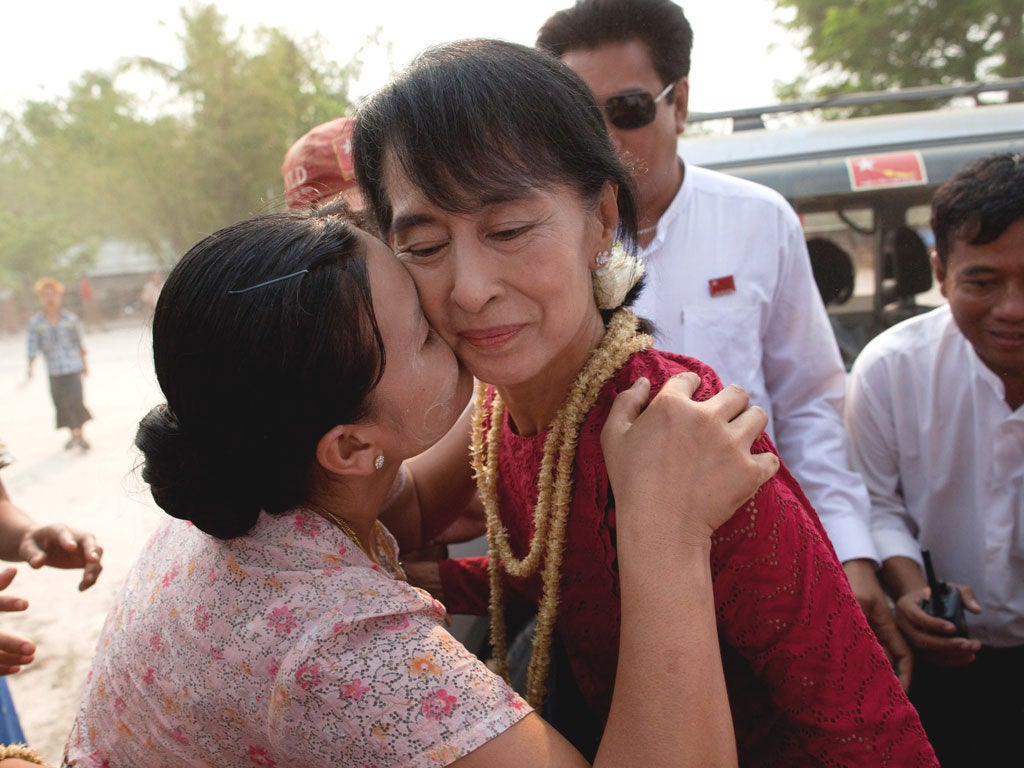Suu Kyi secures foothold in parliament after 24 years – but now comes hard part
First task for NLD figurehead must be to change the constitution, says Peter Popham

Your support helps us to tell the story
From reproductive rights to climate change to Big Tech, The Independent is on the ground when the story is developing. Whether it's investigating the financials of Elon Musk's pro-Trump PAC or producing our latest documentary, 'The A Word', which shines a light on the American women fighting for reproductive rights, we know how important it is to parse out the facts from the messaging.
At such a critical moment in US history, we need reporters on the ground. Your donation allows us to keep sending journalists to speak to both sides of the story.
The Independent is trusted by Americans across the entire political spectrum. And unlike many other quality news outlets, we choose not to lock Americans out of our reporting and analysis with paywalls. We believe quality journalism should be available to everyone, paid for by those who can afford it.
Your support makes all the difference.Now begins the hard part. Exactly 24 years after returning to Burma to take care of her sick mother and being swept up in the democracy movement, Aung San Suu Kyi can finally stop being an "icon", a "symbol", a "figurehead" and a "poster girl" and get down to the hard graft of trying to turn her country around. Heaven knows, there is plenty to be done.
It was the desire to take up the work of nation-building where her father Aung San left off when he was assassinated that induced Suu Kyi to become involved in Burmese democratic politics, but for more than 15 years that impulse left her staring out at the lake beyond her villa, in detention and shut off from everything and everyone. Now at last she is in a position to make a contribution, but the nature, scale and direction of that contribution remain to be defined.
In name at least, she and her NLD colleagues will be no more than opposition back-benchers in the Naypyidaw parliament. Even though they appear to have won 44 of the seats the party contested, including the four seats on offer in Naypyidaw itself, the regime's stronghold, the party will still hold less than 10 per cent of total seats in the national parliament, which is dominated by the Union Socialist and Development Party, the army's proxy.
There is the possibility of government jobs – and some have even suggestes that she may be appointed prime minister – but Burma's next general election is scheduled for 2015. On Sunday's showing, if the election were to be run fairly, the NLD would stand a good chance of repeating the landslide win they gained in 1990, when the regime, shocked and humiliated, refused to recognise the result.
With a big win in 2015, Ms Suu Kyi and her party would finally have the opportunity to begin work on remaking the country. But they would still be up against the 25 per cent of parliamentary seats held by the military by right, without election; and they would still be in thrall to the Defence Council, which retains the power to dissolve parliament and suspend the constitution on a whim and place the country back under martial law.
To avoid the risk the army's top ranks sabotaging the tender democracy and plunging the nation once again into the trauma of military rule, the NLD needs first and foremost to amend the Constitution which has been in place since a highly suspect referendum in 2008.
For a party with only a few dozen parliamentary seats, this looks like an outsize challenge: the support of all elected MPs plus some of the non-elected soldiers will be required to make it happen. But Ms Suu Kyi has a crucial ally in President Thein Sein, the clean, reform-minded former soldier who is single-handedly responsible for all the positive changes that have occurred in Burma over the past eight months. She has made no secret of her desire to see the Constitution amended, and if she is careful not to intimidate or enrage the old soldiers by whom she will find herself surrounded in Naypyidaw, this particular miracle, too, is not beyond the bounds of possibility.
Then Burma would really be on its way.
Join our commenting forum
Join thought-provoking conversations, follow other Independent readers and see their replies
Comments